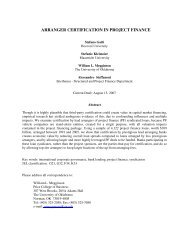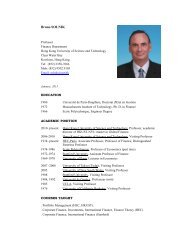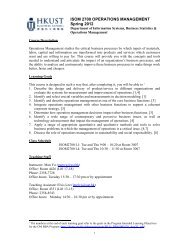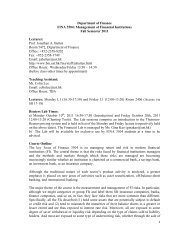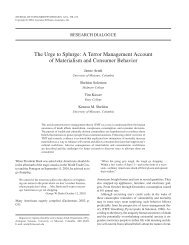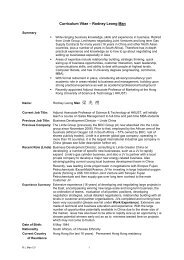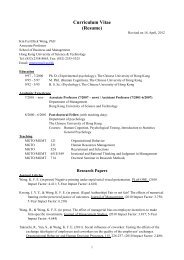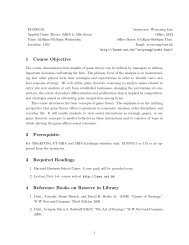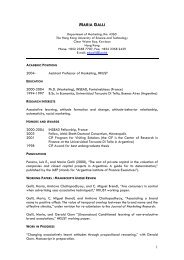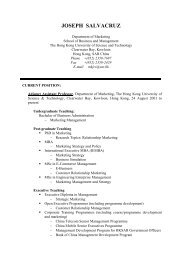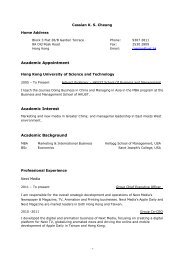Robert S. Wyer, Jr. EDUCATIONAL HISTORY - HKUST Business ...
Robert S. Wyer, Jr. EDUCATIONAL HISTORY - HKUST Business ...
Robert S. Wyer, Jr. EDUCATIONAL HISTORY - HKUST Business ...
You also want an ePaper? Increase the reach of your titles
YUMPU automatically turns print PDFs into web optimized ePapers that Google loves.
<strong>Robert</strong> 16 S. <strong>Wyer</strong><br />
1991<br />
Scott, C. S., Fuhrman, R. W., & <strong>Wyer</strong>, R. S. (1991). Information processing in close relationships. In G.<br />
Fletcher & F. Fincham (Eds.) Cognition in close relationships. Hillsdale, NJ: Erlbaum.<br />
Kuklinski, J., Riggle, E. Ottati, V., Schwarz, N., & <strong>Wyer</strong>, R. S. (1991). The basis of political tolerance<br />
judgments: Cognition or emotion? American Journal of Political Science, 35, 1-27.<br />
<strong>Wyer</strong>, R. S., Budesheim, T. L., Shavitt, S., Riggle, E. J., Melton, J., & Kuklinski, J. H. (1991). Image,<br />
issues and ideology: The processing of information about political candidates. Journal of<br />
Personality and Social Psychology, 61, 533-545.<br />
<strong>Wyer</strong>, R. S. (1991). The construction and use of thought systems: Some theoretical ambiguities. In R.<br />
S. <strong>Wyer</strong> & T. K. Srull (Eds.) Advances in social cognition, vol. 4: The content, structure and<br />
operation of thought systems. Hillsdale, NJ: Erlbaum.<br />
1992<br />
Gruenfeld, D. H., & <strong>Wyer</strong>, R. S. (1992). The semantics and pragmatics of social influence; How<br />
affirmations and denials affect beliefs in referent propositions. Journal of Personality and Social<br />
Psychology, 62, 33-49.<br />
<strong>Wyer</strong>, R. S., Lambert, A. J., Budesheim, T. L., & Gruenfeld, D. H. (1992). Theory and research on<br />
person impression formation: A look to the future. In L. Martin & A. Tesser (Eds.) The<br />
construction of social reality. Hillsdale, NJ: Erlbaum.<br />
Kuklinski, J. H., Riggle, E., Ottati, V., Schwarz, N., & <strong>Wyer</strong>, R. S. (1992). Political tolerance; with and<br />
without thinking. In G. E. Markus & J. L. Sullivan (Eds.) Reconsidering American Democracy.<br />
Chicago: University of Chicago Press.<br />
Riggle, E. D., Ottati, V. C., <strong>Wyer</strong>, R. S., Kuklinski, J. H., & Schwarz, N. (1992). Bases of political<br />
judgment: The role of a candidate's physical attractiveness, party membership and voting record.<br />
American Political Science Review,<br />
<strong>Wyer</strong>, R. S., & Collins, J. E. (1992). A theory of humor elicitation. Psychological Review, 99, 663-688.<br />
1993<br />
Trafimow, D., & <strong>Wyer</strong>, R. S. (1993). The cognitive representation of mundane social events. Journal of<br />
Personality and Social Psychology, 64, 365-376.<br />
Li, W. K., Leung, K., & <strong>Wyer</strong>, R. S. (1993). The roles of country of origin information on buyers'<br />
evaluations: Signal or attribute? Advances in Consumer Research, 20, 689-689.<br />
Martin, L. L., Ward, D. W., Achee, J. W., & <strong>Wyer</strong>, R. W. (1993). Mood as input: People have to<br />
interpret the motivational implications of their moods. Journal of Personality and Social<br />
Psychology, 64, 317-326.<br />
<strong>Wyer</strong>, R. S., & Ottati, V. C. (1993). Political information processing. In S. Iyengar & W. J. McGuire<br />
(Eds.) Current approaches to political psychology. Durham, NC: Duke University Press.<br />
16




